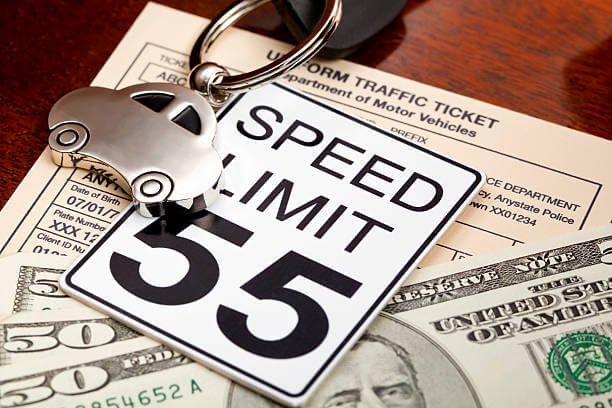How Long Does a Speeding Ticket Stay on Your Record?
Speeding tickets are one of the most common traffic violations drivers encounter. Whether you were in a hurry, distracted or simply didn’t notice your speedometer, a speeding ticket can be an inconvenience. However, beyond the fines what most people want to know is how long that speeding ticket will stay on their driving record.
The duration a speeding ticket remains on your record depends on various factors, including where the violation occurred, the severity of the speeding, and whether you’ve committed any other traffic violations.
In this blog post, we will dive deep into the details of how long a speeding ticket stays on your record, how it can affect your driving privileges, and what you can do to minimize its impact.
1. Understanding Traffic Records
Before we explore how long a speeding ticket stays on your record, let’s first understand what a traffic record is. A traffic record, also known as a driving record or motor vehicle record (MVR), is a document that contains information about your driving history. It includes any accidents, violations, and tickets you have received throughout your time as a driver.
Your traffic record is used by insurance companies, law enforcement, and even some employers to assess your driving behavior. It helps determine whether you are a safe driver or someone who poses a higher risk on the road. Therefore, having a speeding ticket on your record can impact your driving privileges and insurance rates.
2. How Long Does a Speeding Ticket Stay on Your Record?
In general, the length of time a speeding ticket stays on your driving record depends on your state’s traffic laws. Different states have varying rules and regulations about how long traffic violations remain on your record. However, most states follow a general guideline, with speeding tickets typically staying on your record for 3 to 5 years.
Here is a breakdown of the factors that influence the duration a speeding ticket stays on your record:
a. State Laws
Each state has its own rules regarding how long a speeding ticket will stay on your driving record. For example:
- In California, a speeding ticket will remain on your record for 3 years.
- In New York, speeding violations are typically recorded for 3 years.
- In Florida, the ticket will stay on your record for 5 years.
While most states have a duration between 3 to 5 years, some states might have specific circumstances under which the ticket might stay on your record for a longer period.
b. Severity of the Speeding Violation
The severity of the speeding violation also plays a role in how long the ticket stays on your record. Minor speeding violations (such as going a few miles over the limit) are generally removed after a few years, while more serious violations (such as speeding in a construction zone or exceeding the speed limit by a significant margin) could stay on your record for a longer period.
In some cases, if you are caught speeding at excessively high speeds, you may face more serious penalties, including higher fines, points on your license, and a longer duration for the violation to remain on your record.
c. Points on Your License
In most states, a speeding ticket results in the accumulation of points on your driving record. The number of points depends on how much you exceeded the speed limit. For example in Texas, you may receive 2 points for speeding by 1 to 5 mph over the limit and up to 6 points for speeding more than 30 mph over the limit. These points can remain on your record for 3 years in Texas, even if the ticket itself is removed.
If you accumulate too many points on your license, you could face additional penalties, such as:
- License suspension or revocation.
- Increased insurance premiums.
- Requirement to attend driving courses.
d. Court Decisions and Probation
Sometimes, a court may allow you to attend a traffic school or defensive driving course to remove points from your record. If the court permits this, successfully completing the course can help you avoid the speeding violation appearing on your record, or reduce the duration it stays there.
Some states allow you to take traffic school or a defensive driving course to remove the violation from your record, but only under certain conditions (for example, if you have not attended such a course in the last 18 months).
e. Commercial Driver’s License (CDL)
If you hold a Commercial Driver’s License (CDL), the rules for speeding tickets are stricter. A speeding violation on a CDL record can have severe consequences, including the suspension of your commercial driving privileges. For instance:
- If you are caught speeding 15 mph or more over the speed limit, the ticket could stay on your CDL record for up to 5 years.
- For serious violations, such as speeding in a construction zone or reckless driving, the violation may result in even more severe penalties and longer durations.
Related: How Long is a School Bus?
3. The Impact of a Speeding Ticket on Your Insurance
A speeding ticket doesn’t just affect your driving record—it can also impact your car insurance rates. Insurance companies use your driving record to determine your level of risk as a driver. If your record shows a speeding ticket, they may consider you a higher risk, which could lead to higher premiums.

The increase in insurance premiums due to a speeding ticket can vary depending on:
- The severity of the violation.
- Your previous driving history.
- The insurance company’s policies.
In most cases, your insurance rates will rise after a speeding ticket. However, the increase may only be temporary and last for the duration that the ticket remains on your record (usually 3 to 5 years). Once the ticket is removed from your record, your insurance rates could return to normal.
4. What Can You Do to Minimize the Impact of a Speeding Ticket?
While getting a speeding ticket is frustrating, there are steps you can take to minimize the impact it has on your record and insurance rates:
a. Attend Traffic School
In many states, attending traffic school or a defensive driving course can help you avoid points on your driving record. This might be an option if you’re eligible and if the violation is minor. It is important to check with the court or DMV to see if this option is available.
b. Contest the Ticket
If you believe the speeding ticket was issued unfairly or that the radar gun or speed limit sign was inaccurate, you have the right to contest the ticket in court. If you win the case, the violation will not be added to your driving record. However, contesting a speeding ticket can be time-consuming and costly, and there is no guarantee of success.
c. Request a Reduction
In some cases, you may be able to work out a deal with the court to have your violation reduced. For example, if you were caught speeding by a small margin, the court may allow you to pay a smaller fine or take a driving course to have the offense reduced or removed from your record.
d. Monitor Your Driving Record
After a speeding ticket is issued, it’s important to regularly monitor your driving record to ensure that the violation is removed after the appropriate amount of time. You can request a copy of your record from the DMV or relevant local authority.
e. Consider Using Legal Services
If the consequences of a speeding ticket are severe, especially if you are facing higher insurance premiums or risk of license suspension, it might be worth hiring a lawyer. A traffic attorney can advise you on how to handle the ticket, possibly negotiate a reduction in penalties, or assist in contesting the ticket.
Conclusion
Speeding tickets can remain on your driving record for a period of 3 to 5 years, depending on your state and the severity of the violation. The ticket’s duration on your record can affect your driving privileges, insurance premiums, and even your employment opportunities if a background check is conducted. However, by attending traffic school, contesting the ticket, or negotiating with the court, you can potentially minimize the ticket’s impact.







